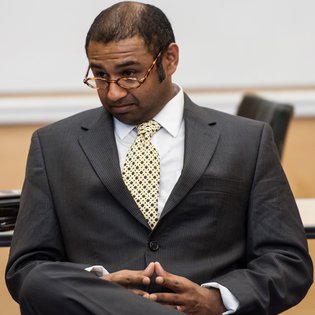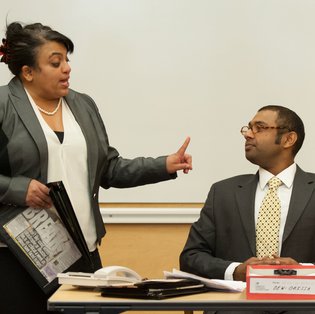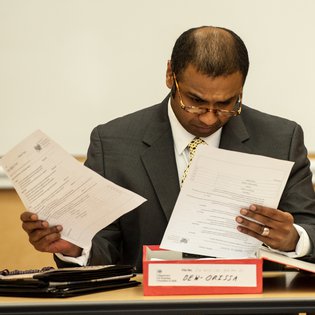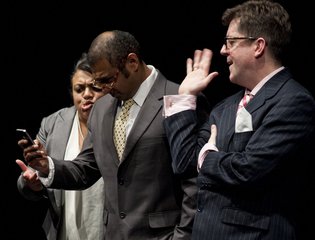Human Rights!
Bloody Human Rights!
A Queen Mary University of London public engagement project in association with Amnesty International and Menagerie Theatre Company.
2 Weeks. 7 Performances. 500 Spectactors. 10 Solutions.
1 Future.
The Minister and the issues behind it
The Minister continues our story of BEW’s attempt to privatize a community well in India. It is written as an incomplete story (although we can guess what may happen next) that allows for the characters to be “hotseated” at the end. (literally sat in front of the audience who then question the characters) The Minister contains a lot of important problematic features of business human rights abuse ranging through:
- The ease of access to public power that business has
- Water as a human right versus commodity
- The UK business and human rights “nuanced” legal position
- The complexity of corporate structure which allows responsibility to be evaded
- The UN Business and Human Rights Guiding Principles
- The role of lawyers
- Legality trumping moral/ethical approaches.

In terms of our story the consequences of the death of Basanti Dash have been playing out locally in Orissa with riots and the Indian government threatening to remove the collection rights concession and arrest BEW officials. Those consequences have also now flowed to London where the Indian government (an important trade partner) wants the British government to condemn BEW. This task has now landed on the desk of our new business Minister on his first day. Assisted by his special adviser, Becky Madison, the Minister has drafted a press release condemning BEW as human rights abusers. Unfortunately for the Minister, the company is aware of the impending press release and George “The Shark” Billings the CEO of BEW UK PLC is on his way to see the Minister to stop the press release. Therein lies the central tension - the Minister is under pressure from the Prime Minister and the Indian government to issue the press release and George needs to stop them. Becky will try to keep the Minister focused on the agreed press release but events soon complicate things further.

George is really the central character here as he tries to get his way by bullying the Minister. However he quickly moves to express his regret at the death of Basanti Dash and intooduce a subtle argument that “most” of the 42 million in Orissa will get access to healthy water for the first time. As for the water charges, these are set at minimal levels to ensure a return on the investment. He also makes the important point that the Indian government will never invest in healthy water infrastructure like BEW will. George, as a character, is set up both as a corporate CEO caricature but also to make important points about the reason for water privatization, which is often because of government neglect or lack of funds to invest. George sees BEW, whether cynically or not, as the good guys here or at least not the bad guys, hence his indignation at the press release condemning BEW.

Becky introduces the issue of water as a human right but George fights back pointing out that it is a commodity and that he is the one who provides access to healthy water, which is the real issue. George raises the human rights advice he was given before investing. The UK “nuanced” legal position is clear: “The UK does not owe legal obligations to ensure that UK companies comply with UK human rights standards overseas”. The Human Rights Toolkit George refers to is a real document used to brief UK overseas missions on business and human rights. It is full of admiration for business and human rights compliance, but buried in a footnote is the UK general legal position on its obligations regarding business and human rights - i.e. it has none. (The Toolkit and other relevant documents can be found in the "Researching the Minister" section below.) It sends a clear message to UK businesses operating abroad that the UK government does not recognize an obligation to ensure human rights compliance. It is an unhelpful proposition that business and human rights activists on the ground and at the international policy level hear from the British government and its missions again and again. It also has the effect that UK businesses operating abroad can rely on the UK government staying out of any business and human rights abuse issues they may face.

For the Minister though, this is a problem, as George is right the UK government legal position is clear on the matter. Things get more complicated when an Amnesty activist and UK citizen, Ms Bentley, has her human rights abused by BEW in India. As the Minister says, “[s]o our policy is we are not concerned with UK companies abusing the human rights of non-British citizens but we are if they abuse the human rights of British citizens. Is that right? I can’t say that in a press release can I?” All this provides George with leverage to introduce his suggested press release drafted by BEW's lawyers, outlining how BEW UK is not legally responsible for the actions of BEW India because it has invested through a chain of 100 other legally separate companies. “We are not responsible for anything our companies do if we don’t want to be and we don’t.”

George makes the point repeatedly that legally they have done nothing wrong and if the UK government wants formally to adopt the UN's position on state responsibility for business and human rights in the UN's Guiding Principles on Business and Human Rights then fine, but if not, stay out of it. Here, and with his point about having no legal responsibility for the actions of BEW India, George is making another important point which arises repeatedly in business human rights abuse cases – that of legality justifying or neutralising abuse. The law of many countries, including the UK, allows corporations to structure themselves to avoid full liability for many things, including the consequence of human rights abuse. George is arguably right when he claims that BEW UK PLC is not responsible for the actions of BEW India and again when he says the UK should act as it said it would and stay out of business human rights issues. However, Becky points out the danger here in the Minister accepting BEW's position, in that the public, indeed everyone, thinks that BEW UK is responsibile for BEW India, and that all this technical legal jargon is fraudulent. Both make good points, but George's point has weight – what we have done is legal and if you want it to be otherwise change the law and we will comply. The play ends with a very clear threat from George, but confusion about the issues. At the end of the first play, “The Well”, things seemed relatively clear; by the end of The Minister things have started to get much more complex. At this point the audience gets the chance to hotseat the characters on their positions.

Researching The Minister
The issues in The Minister reflect the legal complexity that quickly appears in business human rights abuse cases. The first is the most obvious - the ease of access to public power and powerful legal advice that business has, particularly when compared to affected communities and NGOs. This is a recurring issue globally whether it be in the UK or India. Similarly, the use of complex corporate forms, again based on powerful legal advice, to evade liability remains a powerful tool utilised by multinational companies. These issues are explored in a 2014 Amnesty International report called "Injustice Incorporated" which you can find here. Again, as in The Well, water as a human right is an issue in The Minister, with George firmly of the view that it is a commodity and that BEW is a human rights facilitator by providing water to "most" of the 42 million in Orissa. Resources on water as a human right can be found here.

The UK's "nuanced" legal position on its business and human rights obligations remains a problem, although the UK's rhetoric has softened since 2013 and UK missions overseas will now assist or at least engage with business human rights defenders. You can find the UK Business and Human Rights Toolkit here with the vitally important UK legal position that George reads, buried in footnote 3. The UK has no plans to give up its "nuanced" legal difference with the United Nations on the state obligation to ensure business compliance with human rights norms but now has an action plan for engaging with the United Nation's Guiding Principles on Business and Human Rights. The action plan can be found here with commentary from a number of sources. The UN Guiding Principles can be found here. That "engagement" however has not stopped the UK Government siding with UK businesses on limiting the application of Human Rights standards abroad, as freedom of information requests made by Amnesty International revealed in April 2014.
George's points about legality remain a powerful argument used by businesses involved in human rights abuse. For a good overview of why law generally trumps morality see this essay by Steven Shavell here. It does not help when corporations get to influence the shape of the law but it's a good starting point in any discussion of law versus morality when companies are involved. George is right: if we wish the law to be other than it is then we must advocate for change. That starts with you and what you think of the issues presented here. This was one of the points of the Human Rights! Bloody Human Rights! project: getting people to think about and come up with ideas that would fix or at least address these issues. The speed legislation our seven audiences produced can be found here. If you have your own ideas, let us know by leaving a comment below.

Do It Yourself
If you fancy yourself as an actor, director or facilitator/difficultator, here is your big chance. Have a look at the "How it works" film here and use our script for The Minister below plus the film on this page above. You can then perform The Minister and see if your audience of spectactors can fix the problems by hotseating your actors. Remember, you need not just those prepared to act, you need people who are willing to read up on the issues with the resources provided and argue their character's case. It's important that they stay in character no matter what they really believe. That said, we leave it up to you as to how you do it, all we ask is that you email us here to let us know you are using the scripts and that you acknowledge the Human Rights! Bloody Human Rights! project when you perform them. Or you may simply want to read the script and contemplate the issues - feel free, but let us know what you think in the comment box below.

Hotseating it
At the end of The Minister, the audience got to meet the characters and ask them questions. Even though each audience had already been involved in the interactivity of The Well there was always a low expectation when it came to meeting the characters in the Minister. So each evening the questions would begin slowly and a bit wearily but quickly the audience would up their game as they appeared to be present with a "real" Minister or CEO. Things would really come alive then. This was always one of the delights of the performances, as the actors, Patrick and Alan had worked very hard on the characters backstories and their understanding of the issues. The character of the Minister in some ways was the easiest to brief, as the audience totally accepted a weasily evasive response as normal from a Minister. This meant Shane Shambhu, who was playing the Minister, could be evasive if he did not know the answer and still appear ministerial. Becky, played by Rina Fatania, got the hardest time from the audience as she would quickly reveal she did not agree with UK policy on Business and Human rights but hoped that it would be reviewed.

George however would always be the crowds favourite as they loved to hate him but found it very difficult to refute his arguments. The hotseating of George was one of the more worrying performance aspects of the project as Neil Bromley, who played George, had to understand a mass of complex legal arguments so that he could both explain them to members of the public and argue with the experts in the audience. Alan worked closely with Neil on this, who totally absorbed the legal arguments and did this so well he was utterly convincing, winning most of the arguments. If he was in trouble he fell back on throwing it back on the audience with "I'm not the bad guy here. 42 million people that's how many people will benefit from clean healthy water. What would you do - not clean the wells?" Oddly, not many people asked him about the death of Basanti which started all this.

Tell us what you think
The driving ambition behind the Human Rights! Bloody Human Rights! project was a shared need by Professor Alan Dignam and Amnesty International to raise public awareness of important but complex aspects of business involvement in human rights abuse. This is the outcome.
If you performed The Minister, tell us about your experience or if you just enjoyed watching and reading and want to comment generally, feel free to leave a comment on the home page. Business and government engagement on the issues raised here will only increase if public pressure is brought. That future starts with you.
Copyright © Professor Alan Dignam All Rights Reserved
